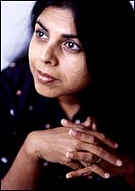|
|
Online Texts for Craig White's Literature Courses
|
|
|
Restroom by Chitra Banerjee Divakaruni |
 |
|
Biographical background: 1956: Born in Kolkata (Calcutta), India. 1976: Graduated from University of Calcutta (1976), moved to the USA and received an M.A. in English from Wright State University in Ohio. 1985: Completed Ph.D. in English at University of California at Berkeley with dissertation on Elizabethan English playwright Christopher Marlowe. Divakaruni has been an activist against domestic abuse in both India and the United States. She is currently the McDavid Professor of Writing at the University of Houston. Divakaruni's poetry and fiction, often concerning South Asian immigrants, have received a number of awards and been widely published in magazines and collected volumes. Novels include Mistress of Spices (1997) and Sister of My Heart (1999). Her young adult series, Brotherhood of the Conch, is set entirely in India. |
|
Discussion questions:
1. How does the poem register the "shock" of first-generation immigration?
2. How does an immigrant see America in a way that native-born Americans cannot?
3. How do the setting or characters of the USA's dominant culture appear?
4. What traditional or Old-World identities, attitudes, or behaviors does the speaker of the poem demonstrate?
Instructor's note: The sub-genre of the poem below may be classified either as a prose poem or as flash fiction, either of which is a hybrid form that resembles prose but with poetry's intensive use of language and figurative speech such as symbols and metaphors.
![]()
Restroom
I push out of Customs, stumble, almost fall, legs numb from twelve hours in the plane, bladder like it's caught between the bajra*-crushing stones they use back in the village. I hadn't known how to tell the man next to me, so large and red-faced, to move so I could go to the toilet. Even if my mouth could shape the strange guttural sounds, I couldn't have said it for the shame of it, the voices in my head, mother, grandmother, widow-aunt, telling me women did not speak of body-things.
I press my thighs together, look for him. Eight years. Will I recognize him? Will he walk briskly like the pale men streaming past me, swinging a case, a grey coat thrown over his arm? Will he know me? I shift the heavy bag from hand to hand, flex sore muscles. The thin plastic straps have cut into my fingers, a couple of nails broken from gripping the armrest, take-off time, that sharp angled rush into the sky, the houses and streets of Bombay flattened and falling away. Teeth biting down to keep in the crying, the hot bile so much worse than morning sickness. Hollow pit inside me, like after my daughter's birth. Had to leave her with my mother-in-law because he said we couldn't afford a child with us now. I'll have to work in the store all day, and who would watch her. I know how important the store is. How he saved for it, one meal a day, rice and water, washed his pants and shirt by hand each night. Now it's half his. A bad part of town, he wrote, but good money, especially in liquor. I know I'll be a good worker. I'm used to it, digging in the bajra* fields all morning, then home to cook chapatis** for twelve over the open wood fire, pulling water from the well through the burning afternoon. Soon we'll have enough to bring our daughter, and maybe, if God wills, we'll have another, this time a strong son to carry the family name.
But why isn't he here? And this man, so huge in his blue suit, thrusting at me a card with his picture and letters that scurry like black ants so I can't read? He's saying something. I try so hard to hear, my head hurts. I finally catch a name. His name. The word Hospital. Legs shaking so much I have to sit down on the suitcase. A gun, shiny-black, on the man's hip. He speaks slowly, very loudly, opening his mouth wide each time. Robbery. Shooting. He points to his left shoulder. Shakes his head. Not dead. Hospital. He waits. I keep my eyes open so the redness won't cover me. Band of steel around my chest, tongue too heavy to move. He is carrying my suitcase, so I follow. Then I see the sign, WOMEN. I know what that means. Niru-ben explained it to me. I make hand-gestures to the man, pointing. He nods, OK, OK.
I've never seen anything like this before. Long lights everywhere, lines of mirrors. Taps, four, six, eight of them, faucets gleaming, the white sinks shining like in a fairytale. And the women with their bright red lips, hair short and curling around their faces in golds and browns, bare, daring honey-colored legs, their short skirts, black, maroon, the thin, thin points of their high heels. I go into a stall, just like the others are doing. Can't figure out the lock, so I have to hold on to the door. The porcelain is cold against the backs of my thighs, but it feels so good, all that pent-up fluid leaving me in a clean rush. Soft women voices hold me, a sudden laugh, silk-rustlings. The redness is far now. The air fills with a perfume I don't know. I step out, breathe deeply, fill my lungs with it. If I can count to twenty without letting go, everything will be all right. I turn on the faucet. Water flows and flows over my hands, warm and full of light, a blessing.
![]()
*bajra = millet, grain
**chapati = unleavened flatbread



